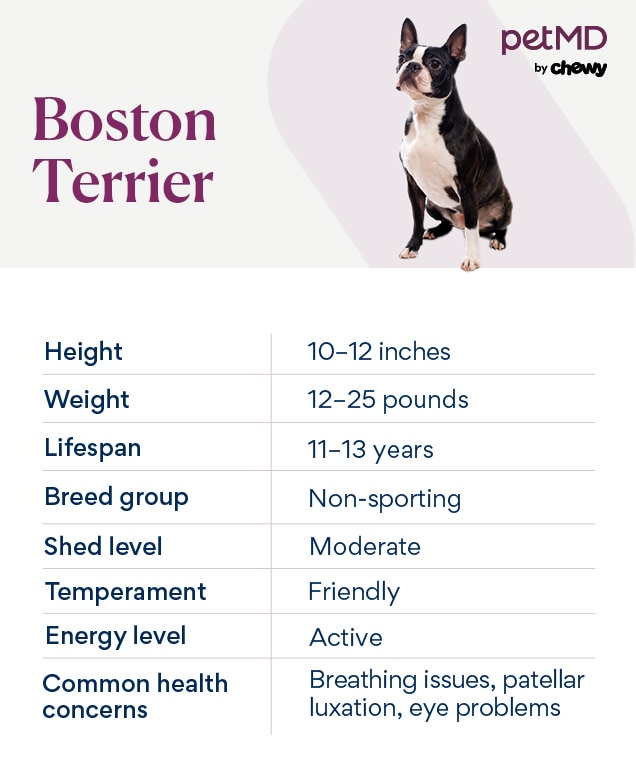Boston Terriers often face issues like arthritis, dental problems, and heart disease as they age. Regular vet check-ups and a healthy lifestyle can help manage these conditions.
As Boston Terriers grow older, they encounter a range of health challenges that can affect their quality of life. These lovable companions typically live between 10 to 15 years, and their needs change significantly during this time. Owners should be aware of common age-related problems, such as joint pain, obesity, and cognitive decline.
Understanding these issues helps in providing the best care possible. Regular vet visits, proper nutrition, and exercise tailored to their age can make a significant difference. Caring for an aging Boston Terrier requires attention and compassion, ensuring they enjoy their golden years comfortably.

Credit: www.ufaw.org.uk
Introduction To Boston Terrier Seniorhood
Boston Terriers are lively and lovable companions. As they age, they face unique challenges. Understanding these challenges helps owners provide better care. Seniorhood brings changes in health and behavior. It’s essential to recognize these signs early.
Characteristics Of An Aging Boston Terrier
Aging Boston Terriers show different signs. Here are some common characteristics:
- Reduced Energy: Less playful and more tired.
- Joint Issues: Stiffness or limping while walking.
- Weight Changes: Weight gain or loss may occur.
- Dental Problems: Bad breath or difficulty eating.
- Changes in Vision: Cloudy eyes or difficulty seeing.
These changes affect their daily life. Regular vet check-ups are important. Early detection improves their quality of life.
When Does A Boston Terrier Become A Senior?
Boston Terriers typically reach senior status at around 7 years. Factors influencing this include:
| Factor | Impact on Aging |
|---|---|
| Size | Smaller breeds age slower than larger breeds. |
| Health | Pre-existing conditions can speed up aging. |
| Genetics | Some lines may have longer lifespans. |
Recognizing senior signs early helps improve their care. Owners should adapt routines for their aging Boston Terrier.
Common Health Issues In Elderly Boston Terriers
Elderly Boston Terriers face various health challenges. Understanding these issues helps in providing better care. Regular vet visits and monitoring are essential for their well-being.
Joint And Bone Health: Arthritis And Dysplasia
Joint health is crucial for elderly Boston Terriers. Two common conditions are:
- Arthritis: This causes pain and stiffness in joints.
- Dysplasia: Abnormal joint formation leads to discomfort.
Signs to watch for include:
- Difficulty in standing or walking.
- Reluctance to jump or climb stairs.
- Changes in behavior, like irritability.
Management options include:
- Weight management to reduce stress on joints.
- Anti-inflammatory medications as prescribed by a vet.
- Regular, gentle exercise to maintain mobility.
Vision Loss And Eye Conditions
As Boston Terriers age, they may develop vision issues. Common conditions include:
- Cataracts: Cloudy lenses leading to blurred vision.
- Glaucoma: Increased pressure in the eye causing pain.
Signs of vision loss may include:
- Difficulty navigating familiar spaces.
- Increased bumping into objects.
- Changes in behavior, like hesitance to go outside.
Regular eye check-ups are important for early detection. Treatments may involve:
| Condition | Treatment Options |
|---|---|
| Cataracts | Surgery to remove cloudy lenses. |
| Glaucoma | Medications to lower eye pressure. |
Dental Problems In Aging Boston Terriers
As Boston Terriers age, they often face various dental issues. These problems can lead to pain and discomfort. It’s crucial to recognize and address these issues early.
Preventing Tooth Decay And Gum Disease
Tooth decay and gum disease are common in older Boston Terriers. Here are some effective ways to prevent these issues:
- Regular Brushing: Brush your dog’s teeth daily.
- Dental Chews: Offer dental chews to help clean teeth.
- Healthy Diet: Provide high-quality food that supports dental health.
- Water Additives: Use water additives designed for dental care.
- Limit Sugary Treats: Avoid giving sugary snacks or human food.
Regular Dental Check-ups And Care
Regular dental check-ups are vital for aging Boston Terriers. A veterinarian can spot issues early. Here are some important aspects:
| Check-up Frequency | Purpose |
|---|---|
| Every 6 months | Preventive care and early detection |
| As needed | Treatment of existing dental problems |
At home, monitor your dog’s dental health. Look for signs like:
- Bad breath
- Loose teeth
- Swollen gums
- Pawing at the mouth
Taking these steps helps maintain your Boston Terrier’s dental health.

Credit: www.petmd.com
Heart And Respiratory Concerns
Boston Terriers face unique health challenges as they age. Two major issues are heart disease and breathing problems. Understanding these concerns helps owners provide better care.
Managing Heart Disease
Heart disease is common in older Boston Terriers. Symptoms may include:
- Coughing
- Fatigue
- Difficulty breathing
Regular vet check-ups are crucial. Early detection can improve treatment options. Here are some management tips:
- Monitor your dog’s weight.
- Provide a heart-healthy diet.
- Ensure regular exercise, but avoid overexertion.
- Administer prescribed medications on time.
Keep an eye on any changes in behavior or health. Report these to your vet immediately.
Breathing Problems And Brachycephalic Syndrome
Boston Terriers are brachycephalic. This means they have short noses. This structure can cause breathing problems. Signs of respiratory issues include:
- Noisy breathing
- Excessive panting
- Gagging or coughing
To help manage these symptoms:
- Avoid hot and humid weather.
- Limit strenuous activities.
- Keep your dog calm during stress.
Regular vet visits can help monitor respiratory health. Early treatment can prevent severe complications.
Cognitive Decline And Behavioral Changes
Cognitive decline is common in older Boston Terriers. This decline can lead to behavioral changes. Owners need to recognize these signs early. Understanding them helps improve your dog’s quality of life.
Identifying Symptoms Of Canine Cognitive Dysfunction
Canine Cognitive Dysfunction (CCD) affects many senior dogs. Here are some common symptoms:
- Disorientation: Dogs may seem lost in familiar places.
- Changes in Sleep Patterns: Increased nighttime activity or sleeping more.
- Altered Interactions: Less interest in play or family.
- Increased Anxiety: Signs of fear or stress in new situations.
- Housebreaking Issues: Accidents inside the house may occur.
Watch for these signs. Early detection is key for managing CCD.
Managing Behavioral Changes In Senior Dogs
Managing behavioral changes is essential for your Boston Terrier. Here are effective strategies:
- Maintain Routine: Keep feeding, walking, and playtime consistent.
- Provide Mental Stimulation: Use puzzle toys and interactive games.
- Limit Stressors: Create a calm environment at home.
- Consult Your Vet: Discuss medications or supplements that may help.
- Be Patient: Understand that changes take time. Show love and support.
These strategies can help your dog feel more comfortable. Regular check-ups are crucial for monitoring their health.
Diet And Nutrition For Senior Boston Terriers
As Boston Terriers age, their nutritional needs change. A balanced diet helps maintain their health. Special attention to senior dogs’ diets can prevent many old age problems.
Adjusting Diet For Optimal Health
Senior Boston Terriers need specific nutrients. These nutrients support their changing bodies. Focus on these key areas:
- Protein: Choose high-quality protein sources. They help maintain muscle mass.
- Fat: Include healthy fats for energy. Omega-3 fatty acids are great for joints.
- Fiber: Increase fiber for digestive health. It helps prevent constipation.
Consider portion sizes. Older dogs may be less active. Adjust food quantity to prevent weight gain.
| Food Type | Recommended Amount |
|---|---|
| High-quality dry food | 1 to 1.5 cups daily |
| Canned food | 1/2 to 1 cup daily |
| Treats | Limited to 10% of total diet |
Supplements To Support Aging Joints And Cognitive Function
Supplements can help senior Boston Terriers thrive. Consider these popular options:
- Glucosamine: Supports joint health and mobility.
- Chondroitin: Works with glucosamine for joint support.
- Omega-3 fatty acids: Reduces inflammation and supports brain health.
- Antioxidants: Protects cells from damage and supports cognitive function.
Always consult a veterinarian before adding supplements. They can recommend the best options based on your dog’s needs.
Exercise And Mobility For Older Boston Terriers
Keeping older Boston Terriers active is vital for their health. Regular exercise helps maintain muscle tone and joint flexibility. It also supports their mental well-being. However, exercise routines must be safe and tailored to their needs.
Safe Exercise Routines
Older Boston Terriers have unique exercise requirements. Their routines should be gentle and consistent. Here are some safe exercise options:
- Short Walks: Take brisk, short walks. Aim for 10-15 minutes.
- Playtime: Use soft toys for gentle play.
- Swimming: Swimming is low-impact and enjoyable.
- Interactive Games: Puzzle toys stimulate their mind.
Monitor their energy levels. Stop if they show signs of fatigue. Always keep water nearby. Hydration is crucial during any activity.
Mobility Aids And Comfort Measures
As Boston Terriers age, they may need extra help. Mobility aids can make a big difference. Consider the following options:
| Mobility Aid | Description |
|---|---|
| Dog Ramps | Helps dogs access cars and furniture easily. |
| Slings | Support their back legs during walks. |
| Orthopedic Beds | Provides comfort for sore joints. |
| Non-Slip Mats | Prevents slipping on floors at home. |
Comfort is essential for older Boston Terriers. Ensure their resting area is quiet and cozy. Regular vet check-ups are important. They can help identify any mobility issues early.
With the right exercise and support, older Boston Terriers can lead happy lives. Keep their routines enjoyable and watch for any changes in behavior.

Credit: maggielovesorbit.com
End-of-life Care And Considerations
Caring for a Boston Terrier in their final years is crucial. Focus on their comfort and happiness. Understanding their needs helps you provide the best care possible.
Quality Of Life Assessments
Assessing your Boston Terrier’s quality of life is essential. Use these criteria to evaluate their well-being:
- Happiness: Is your dog showing joy in daily activities?
- Mobility: Can they walk and play without pain?
- Appetite: Are they eating and drinking normally?
- Breathing: Is their breathing steady and not labored?
- Social Interaction: Do they engage with family and other pets?
Consider using a scale from 1 to 10. This can help track changes over time:
| Score | Description |
|---|---|
| 1 | Pain and suffering evident, no quality of life. |
| 5 | Moderate quality of life, some days good, some bad. |
| 10 | Happy and healthy, enjoying life fully. |
Supporting Your Boston Terrier Through Their Final Chapter
Provide a comforting environment for your dog. Here are ways to support them:
- Comfortable Bed: Ensure they have a soft, warm place to rest.
- Nutrition: Offer easy-to-digest food. Consult your vet for special diets.
- Regular Vet Visits: Keep up with check-ups. Discuss pain management options.
- Gentle Exercise: Short walks can help maintain mobility.
- Time Together: Spend quality moments. Engage in gentle activities they enjoy.
Remember to monitor their condition closely. Changes in behavior or habits may indicate discomfort. Focus on love and companionship during this time.
Frequently Asked Questions
What Are Common Old Age Issues For Boston Terriers?
Common issues include arthritis, dental problems, and vision loss, affecting their mobility and overall quality of life.
How Can I Help My Aging Boston Terrier?
Provide a balanced diet, regular vet check-ups, and gentle exercise to keep them healthy and comfortable.
What Signs Indicate My Boston Terrier Is Aging?
Look for decreased activity, weight changes, and changes in appetite or behavior, signaling potential health concerns.
How Can I Manage My Boston Terrier’s Arthritis?
Consult your vet for pain management options, including medications, weight management, and suitable exercise routines.
Should I Change My Boston Terrier’s Diet As They Age?
Yes, senior diets are formulated to support their changing nutritional needs, promoting better health and vitality. “`
Conclusion
Caring for an aging Boston Terrier requires patience and understanding. Regular vet check-ups can help identify and manage health issues early. Providing a comfortable environment and proper nutrition is essential for their well-being. By staying attentive to their needs, you can ensure your furry friend enjoys a happy, comfortable life in their golden years.
